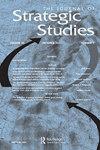Command and military effectiveness in rebel and hybrid battlefield coalitions
IF 2
2区 社会学
Q2 INTERNATIONAL RELATIONS
引用次数: 1
Abstract
ABSTRACT Conventional thinking frames battlefield coalitions as collections of national armies fighting together as multinational coalitions. However, wars also include rebel groups fighting together as coalitions, and rebel groups fighting alongside states in hybrid coalitions. This paper seeks to better understand rebel and hybrid battlefield coalitions, focusing on command and operational military effectiveness. The paper first presents basic ideas about coalition command and military effectiveness from conventional wisdom on multinational coalitions. It then builds on these ideas to explore potential similarities and differences between multinational coalitions on one hand and rebel and hybrid coalitions on the other. In particular, the paper focuses on the nature of different command structures, the varying operational military effectiveness advantages for unified coalition command, and the political motivations for coalition members to resist creating unified command, despite potential effectiveness benefits. The paper concludes by providing policy recommendations to states who lead hybrid coalitions.叛军和混合战场联盟的指挥和军事效能
传统思维将战场联盟视为多国军队共同作战的集合。然而,战争也包括反政府组织联合作战,以及反政府组织以混合联盟的形式与政府并肩作战。本文旨在更好地理解叛军和混合战场联盟,重点关注指挥和作战军事效能。本文首先从多国联盟的传统观念出发,提出了联合指挥和军事效能的基本概念。然后,在这些想法的基础上,探索多国联盟与反叛和混合联盟之间潜在的异同。本文特别关注了不同指挥结构的性质、统一联合指挥的不同作战军事效能优势,以及尽管有潜在的效能效益,但联盟成员国抵制建立统一指挥的政治动机。论文最后向领导混合联盟的国家提供了政策建议。
本文章由计算机程序翻译,如有差异,请以英文原文为准。
求助全文
约1分钟内获得全文
求助全文
来源期刊

Journal of Strategic Studies
Multiple-
CiteScore
4.00
自引率
5.30%
发文量
40
期刊介绍:
The defining feature of The Journal of Strategic Studies is its commitment to multi-disciplinary approach. The editors welcome articles that challenge our historical understanding of man"s efforts to achieve political ends through the application of military and diplomatic means; articles on contemporary security and theoretical controversies of enduring value; and of course articles that explicitly combine the historical and theoretical approaches to the study of modern warfare, defence policy and modern strategy. In addition to a well-established review section, The Journal of Strategic Studies offers its diverse readership a wide range of "special issues" and "special sections".
 求助内容:
求助内容: 应助结果提醒方式:
应助结果提醒方式:


